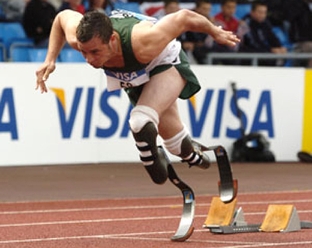"Techno-Doping" and the New Olympics
 Oscar Pistorius, AKA "Blade Runner" -- the South African sprinter who uses carbon fiber prosthetics in place of the lower legs amputated as a child -- has officially lost his bid to run in the 2008 Olympics. He's going to give one last appeal to the International Association of Athletics Federations, but his chances of success are slim. The official reason, according to the BBC:
Oscar Pistorius, AKA "Blade Runner" -- the South African sprinter who uses carbon fiber prosthetics in place of the lower legs amputated as a child -- has officially lost his bid to run in the 2008 Olympics. He's going to give one last appeal to the International Association of Athletics Federations, but his chances of success are slim. The official reason, according to the BBC:
"...his prosthetic limbs give him an advantage over able-bodied opponents..."
For now, Pistorius' artificial legs make him fast, but still human-fast (he came in second at a recent meet); although his prosthetics reduce his energy requirements by 25%, he has yet to hit the qualifying speed for the 400m race. It's entirely possible that, even had the IAAF accepted his bid, he wouldn't have made it to this Olympics.
But it's also entirely possible that, in 2012, he'd be breaking records right and left. And shortly thereafter, he wouldn't be alone in doing so.
The evolution of technological augmentation is progressing faster than natural human biology, and it's clear that it won't be long until these physical enhancements will completely out-class natural human sports capabilities. The growing likelihood that, within the next decade, the fastest humans alive will be "disabled" holds the potential for profound "future shock." As I wrote about last year (in "The Accidental Cyborg"), young athletes facing the choice between rehabilitation and amputation for leg injuries are starting to pick amputation, knowing that the prosthetics could be an improvement, not an impairment.
One of the arguments against doping in sports is that it puts young athletes in the position of choosing between potentially injuring their bodies or having a serious disadvantage. Don't be surprised if someone starts making the same argument about amputation. Once augmented athletes start breaking records, will desperate-to-win young men and women consider intentionally injuring their legs in order to get access to prosthetic augmentations? With people already talking about "techno-doping," this question seems painfully close to an answer.
Moreover, what happens if the "Paralympics" -- the competition for disabled athletes -- becomes an arena for the best runners (and more?) in the world. Would there be a need for a "Supralympics" for technology-enhanced competitors? Would that become a home for "gene-doping," or even some forms of traditional, biochemical enhancement?
Could the Olympics of (say) 2020 be the same kind of sideshow as today's Paralympics, with all of the advertising and attention going to the super-athletes doing things that everyday humans couldn't imagine?






Comments
We're already well on the path to making the traditional Olympics secondary to a more *augmented* competition. However, this is what I wanted to pass on (in the event you hadn't caught my tempTwit on it: "Scientists create beating hearts in lab" (Link). I was keeping that link for when I get back around to posting about fabbed organs.
Posted by: csven | January 14, 2008 9:26 PM
I'm terribly disappointed that he was barred from competing. Look, let the guy compete... he's an inspiration to millions. If he wins (unlikely), then perhaps deal with the (unguaranteed) controversy.
Posted by: Howard Berkey | January 19, 2008 3:44 AM